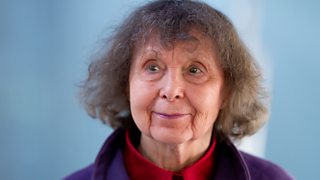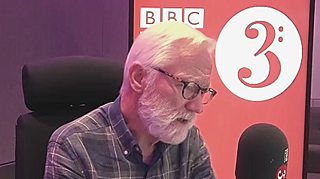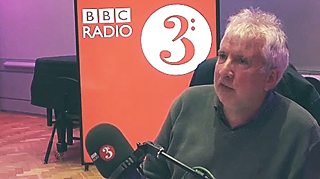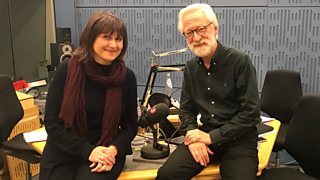Sofia Gubaidulina in words and pictures

To mark Sofia ("Sonya") Gubaidulina’s 90th birthday, for Radio 3's Composer of the Week, Donald Macleod and Gerard McBurney explore different aspects of her progressive and distinctive music.
Gubaidulina has been living in Germany since 1992 and is still busy composing today. When she was born in 1931 in Tatarstan, the Soviet Union was under Stalinist rule. Up until her emigration, she worked as a composer under the strictly regulated conditions determined by Soviet cultural policies.
Notwithstanding her life as a composer behind the Iron Curtain, Gubaidulina developed her own creative path, unswayed by any hint of ideological pressure. Here, Gerard McBurney tells the story of their longstanding friendship with pictures from her friends and colleagues.
One evening in London, in the winter of 1982/1983, I dropped in – as often in those days – on the cellist and writer Elizabeth (Liza) Wilson. She'd recently been visited by her friend the Soviet violinist Oleg Kagan, on one of his first visits to the West since being banned from foreign concert-travel, and he'd left behind with her a trove of recordings of new music from the USSR. Contraband!
"Listen to this," she said, slipping a cassette into the machine. It was the opening of Sofia Gubaidulina's violin concerto, Offertorium, in a recent live performance by Kagan himself, conducted by Gennady Rozhdestvensky. "Who do you think wrote it?" "I have no idea... but whoever he is..." She stopped me. I suppose you could say they'd both stopped me... Liza and Sonya.
Not before time.
Two years later, in the autumn of 1984, I saw Gubaidulina for the first time, at a lecture in a small room at the Moscow Conservatory, given by the renowned musical theorist Yuri Kholopov. The subject was Berg's Wozzeck. The audience was gathered round a large table, and Sonia and her partner, the wonderfully eccentric keyboard player and musical dreamer Pyotr Meshchaninov, were sitting opposite me. I recognised them from photographs. Kholopov, gleeful as a tiger, prowled in front of a blackboard, and Gubaidulina and Meshchaninov smiled and nodded with approval at points my Russian was nowhere near yet good enough for me to be able to understand.
A few weeks later, I and an American friend went to a cavernous amphitheatre in one of the scientific departments of Moscow University, for an exhibition-performance of electronic music created decades earlier for the ANS synthesiser in the Scriabin Museum. Among the pieces was Gubaidulina's Vivente – Non Vivente, and at the end she took a bow. Afterwards, my friend translating, I asked if we could meet. She gave me her telephone number.
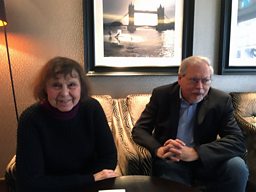
Nearly 40 years have passed, and I no longer remember the order of events, but I certainly and vividly recall my first visit to her little apartment in the north east of Moscow just off Preobrazhenskaya Ploshchad (Transfiguration Square), an area now engulfed by the city but once a country village where Peter the Great had a small palace in the 17th century. As I walked from the metro station to the Khrushchev-era block in which the composer lived, I remember passing the entrance to the Transfiguration Cemetery, a beautiful place which in pre-Revolutionary times had been a centre for Old Believers.
Goodbye! Write well and live intensively!
I rattled up the rickety lift, pressed the bell and the door opened... and my first impression included noticing (I do not know why) that on high shelves out of reach in the tiny hall area were multi-volume sets of the works of Lenin and Stalin. In all these years, I have never asked her what those were doing there.
My Russian was rudimentary, but we talked and talked somehow – about her parents, and especially her father's Tatar background; about what she called the sacred ("sakral'nyie") qualities of particular instruments and sounds, and her partner Pyotr Meshchaninov's deep influence on her ideas about rhythm and proportion; and her passionately-held conviction that every piece of music must contain a moment of what she called "transfiguration" (preobrazheniye... that word again!), that critical moment – as she put it – when the music crosses from one world into another.
We drank tea and nibbled those dry, sweet, gingery rusks called pryaniki, and she generously tolerated my linguistic mistakes (sometimes gently but firmly correcting them) and when time was up, showed me suddenly to the lift and, with a fierce stare, sent me off into the night with sharp words: "Goodbye! Write well and live intensively!", shutting the padded front door firmly in my face before the lift had even arrived.
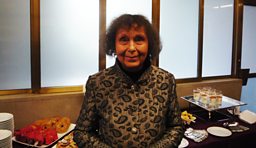
A couple of months later, Dmitri Smirnov and Elena Firsova invited me to their home on the western edge of the city. Gubaidulina was coming round with a recording of her new piece, Perception. We sat on the couch and listened together, all four of us following the score, then gathered round the kitchen table – the immemorial Russian tradition – once more to sip tea, eat and discuss what we had heard.

And from that, so many memories follow: her first trips to the UK, when I met her late one afternoon at Heathrow and drove immediately to Westminster where we walked along the embankment by the Houses of Parliament and she flung her arms in the air with excitement: "The river Thames! The real river Thames!";
a road trip together to the Huddersfield Festival, where, in gaps between performances, I took her to Haworth Parsonage and we walked through the cemetery where the Brontës are buried; another with Elena Firsova to the Cheltenham Festival when, on the way back to London in the car, Gubaidulina started practising phrases learned from an English-language tape, complete with a Prunella Scales accent: "I have washed the shirts and ironed them, and hung them up to dry!" followed by a peal of giggles ("I speak like a parrot!" – kak popugai!); another to Cambridge, a walk along the river and Evensong in King's Chapel.
I especially ruefully recall showing her a new piece of mine in Moscow and her scolding me with the angriest expression I have ever seen on her face: "How dare you make the audience listen all that time, and that's all you give them at the end! That's just cowardice!" Contrite, I phoned her the next morning to thank her for the "lesson" she had given me and unwisely added I had not slept a wink all night: "And a good thing too!", she barked, before launching straight back into the criticisms of the previous evening.
And for some reason I cherish a tiny moment from a festival in Switzerland, where I went to collect her from a room for the evening concert and found her slightly dazed at her desk surrounded by sheets of paper:
"What are you working on?" "I'm fantasizing!" (Fantaziruyu!)
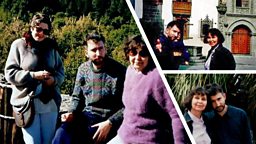
This little collage of photographs brings back other memories too: a trip to the Canary Islands in 1993 for the first performances of her cello concerto, and... the feasting at its height. We went swimming on Gran Canaria, and took a car up the mountain in Tenerife to see fields of lava and banana plantations; the time she came to Chicago with Laurel Fay in 2011 to receive an honorary degree from University of Chicago and her exuberant hilarity at the academic robes she wore and her astonishment at the lavish banquet her American hosts put on... and her gentleness to our young children when we sat down for a meal afterwards; and her recent trip to London in 2019 when she was presented with the Gold Medal of the Royal Philharmonic Society when we met in one of those hotels so dreary the mind reels; and there's a photograph [above] of Gubaidulina and Firsova with a bottle of vodka, which I relish precisely because I was not present. It was taken by her close friend the composer Viktor Suslin. I can hear her chuckling: Khuliganstvo! ("Hooliganism!")
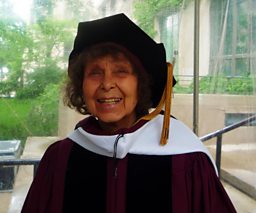
Many of the people dearest to Gubaidulina have died in the many years since her music first seized me by the ears: her daughter Nadia; Pyotr Meshchaninov, whom she married as her third husband (she had so often said "I will never marry again!") so that he could get the healthcare he needed; and a whole array of colleagues and lifelong friends like Kholopov, Schnittke, Denisov and others.
But she is still there, and writing music! I phoned her the other day and she talked about cathedrals and ideas and friends and the piece she is currently working on. I know we are all older, but to me she sounded as young as I remember her that first time 37 years ago. And she ended our conversation with almost the same phrase she used back then: "We must live intensively!"
Sonya, I salute you! Happy Birthday! More music, please!
-
![]()
Composer of the Week: Sofia Gubaidulina
To mark Sofia Gubaidulina’s 90th birthday, Donald Macleod and Gerard McBurney explore five different aspects of her progressive and distinctive music.

More reflections on music-making in the Soviet era
-
![]()
Blacklisted!
Donald Macleod and Gerard McBurney discuss the effects of Soviet oppression on artists.
-
![]()
The soul's journey of In Croce
Donald Macleod and Gerard McBurney discuss the symbolism in Gubaidulina's In Croce.
-
![]()
Composer of the Week: Soviet Russia (1917-1953)
Donald Macleod and Marina Frolova-Walker unravel masterpieces by musicians from the USSR, in the early years.
-
![]()
Composer of the Week: Soviet Russia (1953-1991)
Donald Macleod's and Marina Frolova-Walker's exploration of music from the USSR, moving into the era of Glasnost.
